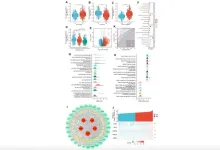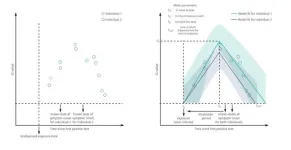(Press-News.org) PITTSBURGH – The University of Pittsburgh School of Pharmacy’s Program Evaluation and Research Unit (PERU) has received a five-year, $7.8 million grant from the National Institute on Drug Abuse to improve quality of care for patients with opioid use disorder across Pennsylvania.
The project will establish the Helping to End Addiction Long-term (HEALing) Measures Center at Pitt, which will focus on developing and implementing measurement-based care into 20 community opioid treatment programs across Pennsylvania with the goal of enhancing treatment access, promoting recovery and reducing fatal overdoses across the commonwealth.
“Improving the quality of patient care requires full system-wide implementation support, system-wide capacity to focus on patient and provider needs, and empowering providers with clinically useful data,” said principal investigator Renee Cloutier, Ph.D., research scientist at PERU in the Pitt School of Pharmacy. “Successful results will set the stage for broader implementation and dissemination that has the potential to transform patient care across Pennsylvania and the country.”
Although opioid overdose deaths in Pennsylvania decreased from 2021 to 2022, opioid use disorder (OUD) and other substance use disorders remain a major public health issue in the commonwealth and across the country. Medications, including buprenorphine, methadone and naltrexone, are an important pillar of treatment for OUD, but about 20% of patients discontinue treatment within the first month and up to 80% within the first six months.
Reducing discontinuation rates of medications for OUD by even a few percentage points could translate into thousands of lives saved, according to the researchers.
“The key to reducing the impact of opioids is getting patients the right treatment at the right time, and then making sure that the quality of treatment is high enough that they can move into stable recovery,” said Cloutier. “Randomized clinical trials that demonstrate the impact of interventions have very controlled conditions, so often when we translate those findings into practice, we see a reduction in effectiveness because people are complicated. We need better data to figure out what is and isn’t working for patients.”
To address this gap and enhance the quality of data that is collected and used in a more systematic way, PERU will expand on an existing partnership with the Pennsylvania Department of Human Services’ Centers of Excellence for Opioid Use Disorder to integrate measurement-based care into existing treatment practices and workflows.
Measurement-based care, which is common in physical and mental health care settings but hasn’t previously been applied to opioid treatment programs, is a model where clinicians systematically evaluate patients’ symptoms on a regular basis to measure how they change over the course of their treatment and use that information to guide care on a personalized level.
“Measurement-based care is about addressing what the patient is experiencing, including symptoms from other conditions or diseases beyond OUD,” said Cloutier. “It’s about getting information to ask what a patient needs and how clinicians can respond to that need or identifying barriers to why they can’t meet that need.”
The project will examine implementation effectiveness, cost-effectiveness and clinical effectiveness, including reduction in patient symptoms and treatment retention. These data will inform ways to increase treatment efficiency and effectiveness, while also providing a roadmap for sustainable ways to scale measurement-based care to new opioid treatment sites.
Other principal investigators on the project are Janice Pringle, Ph.D., of PERU, Kelli Scott, Ph.D., of the New England Addiction Technology Transfer Center, and Arni Aldridge, Ph.D., of Research Triangle Institute (RTI) International. Co-investigators are Erh-Hsuan (Reina) Wang, Ph.D., and Debra Moore, Ph.D., both of PERU.
The HEALing Measures Center will also include collaborations between researchers at Northwestern University Feinberg School of Medicine and (RTI) International, and community partners at the Pennsylvania Department of Human Services, the Pennsylvania Department of Drug and Alcohol Programs, UPMC and the Community Care Behavioral Health Organization.
Research reported in this press release is supported by the National Institute on Drug Abuse of the National Institutes of Health under award number 1RM1DA059395-01. The content is solely the responsibility of the authors and does not necessarily represent the official views of the National Institutes of Health.
END
Pitt receives new grant to improve opioid use disorder treatment
2024-01-30
ELSE PRESS RELEASES FROM THIS DATE:
Researchers craft new way to make high-temperature superconductors – with a twist
2024-01-30
An international team that includes Rutgers University–New Brunswick scientists has developed a new method to make and manipulate a widely studied class of high-temperature superconductors.
This technique should pave the way for the creation of unusual forms of superconductivity in previously unattainable materials.
When cooled to a critical temperature, superconductors can conduct electricity without resistance or energy loss. These materials have intrigued physicists for decades because they can achieve a state of ...
Study suggests secret for getting teens to listen to unsolicited advice
2024-01-30
A new study may hold a secret for getting your teenager to listen to appreciate your unsolicited advice.
The University of California, Riverside, study, which included “emerging adults” — those in their late teens and early 20s — found teens will appreciate parents’ unsolicited advice, but only if the parent is supportive of their teens’ autonomy.
Parents support autonomy by providing clear guidelines for limitations and rules that will be enforced. They ...
Tech inefficiencies, piles of (electronic) paperwork, and increased patient volume contribute to burnout of primary care physicians, study finds
2024-01-30
Burnout is an occupational phenomenon that results from chronic workplace stress, according to the World Health Organization. Burnout often includes emotional exhaustion, negative feelings or mental distance from one’s job, and a low sense of accomplishment at work. COVID-19 increased feelings of burnout in primary care physicians, and a new study, sought to understand primary care clinicians’ perspectives on burnout during the COVID-19 pandemic, the causes of burnout, and strategies to improve clinician well-being.
Inefficiencies of electronic health records systems and high levels of documentation contribute ...
XRCC1: A potential prognostic and immunological biomarker in low-grade gliomas
2024-01-30
“We conducted a comprehensive investigation into the potential of XRCC1 as a valuable diagnostic and prognostic indicator in diverse cancer types.”
BUFFALO, NY- January 30, 2024 – A new research paper was published in Aging (listed by MEDLINE/PubMed as "Aging (Albany NY)" and "Aging-US" by Web of Science) Volume 16, Issue 1, entitled, “XRCC1: a potential prognostic and immunological biomarker in LGG based on systematic pan-cancer analysis.”
X-ray repair cross-complementation ...
Functional bladder tissue regenerated using bone marrow cells
2024-01-30
Scientists from Stanley Manne Children’s Research Institute at Ann & Robert H. Lurie Children’s Hospital of Chicago and Northwestern University succeeded in regenerating fully functional urinary bladder tissue in a long-term study utilizing a non-human primate model. This unique model initially created by the Sharma Research Group explores long term bladder tissue regeneration at both anatomical and physiological levels. The Group used a novel biodegradable scaffold seeded with stem and progenitor cells from the animal’s own bone marrow, which demonstrated a higher degree of success than intestinal segments ...
Tribal program takes addiction treatment on the road
2024-01-30
With the national opioid epidemic disproportionately affecting American Indians and Alaska Natives, a tribal confederation in Oregon decided to take matters into their own hands.
The Confederated Tribes of Grand Ronde not only opened Oregon’s first tribally owned opioid treatment program in Salem in 2021, but a year later, the tribe also began what is believed to be the nation’s first tribally operated mobile medication unit. The mobile bus runs a daily circuit from the tribal reservation in Grand Ronde to McMinnville to Salem, seeing patients and dispensing medications directly to tribal members struggling with an opioid use disorder.
The program appears ...
The emergence of successive SARS-CoV-2 variants of concern during 2020-22 created a need to understand the drivers of such growth
2024-01-30
The emergence of successive SARS-CoV-2 variants of concern during 2020-22 created a need to understand the drivers of such growth; this study uses a Bayesian model to reveal how a set of key covariates (the infecting variant, symptom status, age and number of prior exposures) affect viral kinetics at both individual and population levels
#####
In your coverage, please use this URL to provide access to the freely available paper in PLOS Biology: http://journals.plos.org/plosbiology/article?id=10.1371/journal.pbio.3002463
Article Title: Combined analyses of ...
Mutations in the Cu-Zn superoxide dismutase 1 gene SOD1 can cause familial amyotrophic lateral sclerosis (fALS) in a process that involves dissociation of the SOD1 dimer
2024-01-30
Mutations in the Cu-Zn superoxide dismutase 1 gene SOD1 can cause familial amyotrophic lateral sclerosis (fALS) in a process that involves dissociation of the SOD1 dimer; this study shows that a novel cyclic thiosulfinate cross-linker has favorable drug-like properties and can stabilize the SOD1 dimer in vivo, with therapeutic implications for fALS
#####
In your coverage, please use this URL to provide access to the freely available paper in PLOS Biology: http://journals.plos.org/plosbiology/article?id=10.1371/journal.pbio.3002462
Author ...
Prestigious NIH grant explores repetitive DNA sequences and cell dysfunction
2024-01-30
Dr. Jeannine Gerhardt, an assistant professor of stem cell biology in obstetrics and gynecology and in reproductive medicine at Weill Cornell Medicine, has received a five-year, $2.1 million grant from the National Institute of General Medical Sciences (NIGMS), part of the National Institutes of Health, for the study of repetitive DNA and RNA sequences and the mechanisms by which they cause cell dysfunction and diseases.
The NIGMS Maximizing Investigators’ Research Award is intended to support recipients’ research more broadly and flexibly than standard project grants, which must specify proposed research thoroughly in advance.
“This award is particularly nice because ...
As cities grow, how will city trash, wastewater, and emissions rise?
2024-01-30
More than half of the world’s population—4.4 billion people—lives in cities, and that proportion will grow to two-thirds by the year 2050, according to the United Nations.
As the world’s population expands, and becomes increasingly urbanized, many have raised concerns about the impact of waste—from house trash to wastewater to greenhouse gas emissions—on the planet.
“We as a society tend to ignore the unpleasant side of our production,” says Mingzhen Lu, an assistant professor at New York University’s ...




